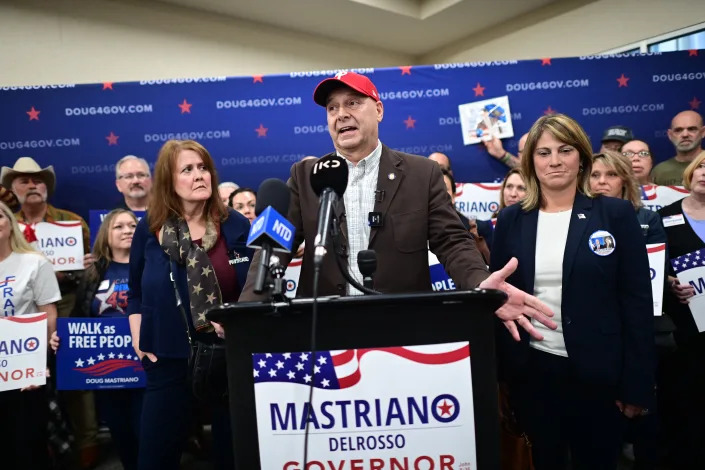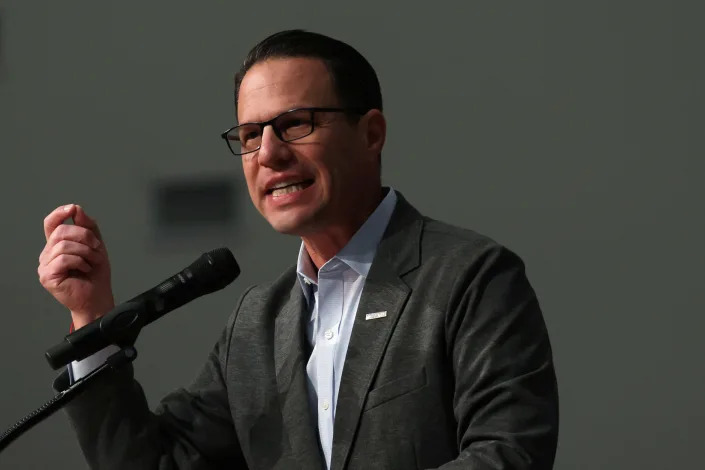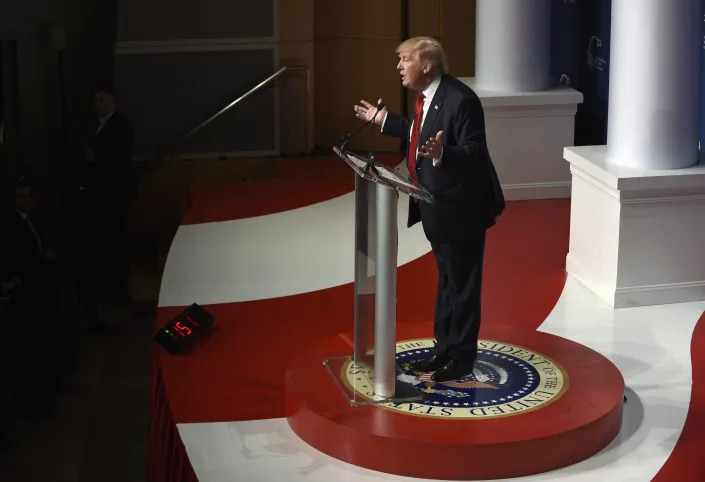
ON MYTHICAL WWI ACE SGT YORK

Pennsylvania Republican gubernatorial candidate Doug Mastriano speaks during a campaign stop in Erie, Pa., Thursday, Sept. 29, 2022. A Canadian university that granted a doctorate in history to Mastriano is investigating a fresh complaint about his work that makes hundreds of allegations of academic fraud. (AP Photo/David Dermer, File)
MARK SCOLFORO
Wed, November 2, 2022
HARRISBURG, Pa. (AP) — A Canadian university that granted a doctorate in history to Doug Mastriano nearly a decade before he became the Republican nominee for governor of Pennsylvania is investigating a fresh complaint about his work that makes multiple allegations of academic fraud in his recently public dissertation.
University of New Brunswick President Paul Mazerolle told The Associated Press in a phone interview Saturday that the school is also bringing in a team of outsiders to review its policies and procedures for graduate study, including issues raised by how Mastriano's research was handled and evaluated.
“Being subject to a complaint, I need to let that process run its course,” Mazerolle said, “recognizing that there's a time issue, and this is almost 10 years ago this was all propagated. And that's why we need to have this looked at through our complaint processes.”
He said the school's lead integrity officer, chemistry professor David MaGee, is performing an initial review to decide if a full investigation is warranted and who should conduct it. There is no time limit.
Mastriano, who was elected to the Pennsylvania Senate in 2019 after decades as a U.S. Army officer, was awarded a doctorate in history in 2013 for his research into American World War I hero Sgt. Alvin York. But that research, which formed the basis of his 2014 book, has long been criticized by other researchers as inaccurate, sloppy and even fraudulent.
Mastriano, Oz hold rallies to get out the Republican vote

Mastriano has not directly responded to numerous requests for comment about his research from The Associated Press, going back almost two years, including on Tuesday. He is currently running against Democratic Attorney General Josh Shapiro in the Nov. 8 election for governor.
But on Monday, he discussed his graduate research during an online interview, saying “the left wing goes after our academic work on the right."
“I mean of all the things I’ve done, it was brutal,” he told Real America's Voice, speaking of his doctoral studies. “And I did have concerns that some of the left-leaning professors there would hold my politics or my military background against me.”
One of the rival researchers who has challenged his work, University of Oklahoma history doctoral student James Gregory, sent the new complaint to New Brunswick administrators on Oct. 6, about a month after the school quietly made public Mastriano's doctoral dissertation. Dissertation embargoes like the one that prevented access to Mastriano's work for nearly a decade are among the topics being examined by the outside team Mazerolle is having look into graduate research policies and practices.
“His dissertation and subsequent book are built upon falsified research," Gregory wrote in a cover letter to a list of what he described as 213 cases of academic misconduct in Mastriano's doctoral thesis. “This has polluted the historiography of Alvin York causing every historian who used his work to have an inaccurate base on which their claims are built.”
In the letter addressed “to whom it should concern,” Gregory recounted how a complaint he made last year, based on problems he identified with the book, was handled. He said MaGee told him the allegations did not warrant a formal investigation and amounted to honest errors that would be corrected.
But Gregory argued the corrections made in response to issues with the book, which were appended to the dissertation in 2021 before it was posted online this August, are themselves “plagued with academic misconduct" and ignored most of what Gregory complained about last year.
“I find this to be a gross case of incompetence for a university which is supposed to uphold academic integrity,” Gregory said. “Not only does it showcase the poor response to a serious allegation, but it also reduces the reputation and level of standards for all other students at the University of New Brunswick.”
Mastriano's dissertation, largely a biography of the war hero from Tennessee, also documented his attempt to locate the precise spot of York's famed gun battle in the woods of northern France in the waning days of the war.
A faculty member who evaluated the work, New Brunswick history professor Jeff Brown, said Mastriano's degree was granted over his protests. Armed with his doctorate, Mastriano finished his military career by teaching at the Army War College in Carlisle, Pennsylvania, until 2017.
The controversy led some current New Brunswick history graduate students to seek a meeting with their department head, and Mazerolle said the fallout has caught his attention.
“I'm hearing generally two things” from faculty and graduate students, Mazerolle said. “One is that people are wanting to get on with their work and that this is kind of a distraction. And then I'm hearing on the other side, there are people who are deeply concerned and worrying about the reputation of the department and worried about the reputation of people's degrees.”
Mazerolle said the external reviewers of the school's processes and policies, who have not yet been named, will focus on the role of faculty advisors as well as the handling of embargoed dissertations.
Richard Yeomans, a doctoral student in history at New Brunswick was among about 20 graduate students who met with administrators to discuss the matter about two weeks ago. He said in an email Wednesday that he doubts MaGee can be impartial, given his response to Gregory’s 2021 complaint.
The graduate students have been “collectively unimpressed with how this situation has been handled, and the disruptions that this has caused to all of us. Of course, we want to get back to our research, but we want and need accountability to do so,” Yeomans said.
Days after filing the new complaint, Gregory received an email from MaGee saying the initial investigation was starting right away.
“It’s unfortunate that it took an entire publicity debacle for UNB to look for actual reviewers to confirm my complaints. I can only hope they do their due diligence this time in regards to the faulty dissertation,” Gregory said Tuesday. “They should also make sure to correct the issues that led to this poor example of research being awarded a Ph.D.”

Pennsylvania Republican gubernatorial candidate Doug Mastriano speaks during a campaign stop in Erie, Pa., Thursday, Sept. 29, 2022. A Canadian university that granted a doctorate in history to Mastriano is investigating a fresh complaint about his work that makes hundreds of allegations of academic fraud. (AP Photo/David Dermer, File)
MARK SCOLFORO
Wed, November 2, 2022
HARRISBURG, Pa. (AP) — A Canadian university that granted a doctorate in history to Doug Mastriano nearly a decade before he became the Republican nominee for governor of Pennsylvania is investigating a fresh complaint about his work that makes multiple allegations of academic fraud in his recently public dissertation.
University of New Brunswick President Paul Mazerolle told The Associated Press in a phone interview Saturday that the school is also bringing in a team of outsiders to review its policies and procedures for graduate study, including issues raised by how Mastriano's research was handled and evaluated.
“Being subject to a complaint, I need to let that process run its course,” Mazerolle said, “recognizing that there's a time issue, and this is almost 10 years ago this was all propagated. And that's why we need to have this looked at through our complaint processes.”
He said the school's lead integrity officer, chemistry professor David MaGee, is performing an initial review to decide if a full investigation is warranted and who should conduct it. There is no time limit.
Mastriano, who was elected to the Pennsylvania Senate in 2019 after decades as a U.S. Army officer, was awarded a doctorate in history in 2013 for his research into American World War I hero Sgt. Alvin York. But that research, which formed the basis of his 2014 book, has long been criticized by other researchers as inaccurate, sloppy and even fraudulent.
Mastriano, Oz hold rallies to get out the Republican vote

Mastriano has not directly responded to numerous requests for comment about his research from The Associated Press, going back almost two years, including on Tuesday. He is currently running against Democratic Attorney General Josh Shapiro in the Nov. 8 election for governor.
But on Monday, he discussed his graduate research during an online interview, saying “the left wing goes after our academic work on the right."
“I mean of all the things I’ve done, it was brutal,” he told Real America's Voice, speaking of his doctoral studies. “And I did have concerns that some of the left-leaning professors there would hold my politics or my military background against me.”
One of the rival researchers who has challenged his work, University of Oklahoma history doctoral student James Gregory, sent the new complaint to New Brunswick administrators on Oct. 6, about a month after the school quietly made public Mastriano's doctoral dissertation. Dissertation embargoes like the one that prevented access to Mastriano's work for nearly a decade are among the topics being examined by the outside team Mazerolle is having look into graduate research policies and practices.
“His dissertation and subsequent book are built upon falsified research," Gregory wrote in a cover letter to a list of what he described as 213 cases of academic misconduct in Mastriano's doctoral thesis. “This has polluted the historiography of Alvin York causing every historian who used his work to have an inaccurate base on which their claims are built.”
In the letter addressed “to whom it should concern,” Gregory recounted how a complaint he made last year, based on problems he identified with the book, was handled. He said MaGee told him the allegations did not warrant a formal investigation and amounted to honest errors that would be corrected.
But Gregory argued the corrections made in response to issues with the book, which were appended to the dissertation in 2021 before it was posted online this August, are themselves “plagued with academic misconduct" and ignored most of what Gregory complained about last year.
“I find this to be a gross case of incompetence for a university which is supposed to uphold academic integrity,” Gregory said. “Not only does it showcase the poor response to a serious allegation, but it also reduces the reputation and level of standards for all other students at the University of New Brunswick.”
Mastriano's dissertation, largely a biography of the war hero from Tennessee, also documented his attempt to locate the precise spot of York's famed gun battle in the woods of northern France in the waning days of the war.
A faculty member who evaluated the work, New Brunswick history professor Jeff Brown, said Mastriano's degree was granted over his protests. Armed with his doctorate, Mastriano finished his military career by teaching at the Army War College in Carlisle, Pennsylvania, until 2017.
The controversy led some current New Brunswick history graduate students to seek a meeting with their department head, and Mazerolle said the fallout has caught his attention.
“I'm hearing generally two things” from faculty and graduate students, Mazerolle said. “One is that people are wanting to get on with their work and that this is kind of a distraction. And then I'm hearing on the other side, there are people who are deeply concerned and worrying about the reputation of the department and worried about the reputation of people's degrees.”
Mazerolle said the external reviewers of the school's processes and policies, who have not yet been named, will focus on the role of faculty advisors as well as the handling of embargoed dissertations.
Richard Yeomans, a doctoral student in history at New Brunswick was among about 20 graduate students who met with administrators to discuss the matter about two weeks ago. He said in an email Wednesday that he doubts MaGee can be impartial, given his response to Gregory’s 2021 complaint.
The graduate students have been “collectively unimpressed with how this situation has been handled, and the disruptions that this has caused to all of us. Of course, we want to get back to our research, but we want and need accountability to do so,” Yeomans said.
Days after filing the new complaint, Gregory received an email from MaGee saying the initial investigation was starting right away.
“It’s unfortunate that it took an entire publicity debacle for UNB to look for actual reviewers to confirm my complaints. I can only hope they do their due diligence this time in regards to the faulty dissertation,” Gregory said Tuesday. “They should also make sure to correct the issues that led to this poor example of research being awarded a Ph.D.”
Trump, Mastriano's wife criticize Jews for not loving Israel enough
Ben Adler
Senior Editor
Wed, November 2, 2022

Republican gubernatorial candidate for Pennsylvania Governor Doug Mastriano, with his wife, Rebecca, left. (Mark Makela/Getty Images)
Prominent Republicans, including former President Donald Trump and the wife of Pennsylvania GOP gubernatorial nominee Doug Mastriano, have recently engaged in an unusual form of antisemitism: attacking American Jews for being insufficiently loyal to Israel.
The most recent instance was last Saturday, when an Israeli reporter asked Mastriano, a Pennsylvania state senator, about his association with the antisemitic founder of the far-right social network Gab and Mastriano’s criticism of his Democratic opponent for sending his children to a Jewish school.
Mastriano’s wife, Rebecca Mastriano, then stepped in front of the microphones and offered a her own response.
“As a family, we so much love Israel,” she said. “In fact, I’m going to say we probably love Israel more than a lot of Jews do, I have to say that.”
She then added that she and her husband have been involved for “at least 10 years [in] outreach to Israel and Jerusalem. We have — I had — visited Israel, say, for five years.”
By responding to a question about antisemitism with a pivot to Israel and a swipe at the many American Jews who do not necessarily support all of the Israeli government’s policies, experts on antisemitism say Mastriano was playing into long-standing tropes that depict Jews as foreigners with loyalty to another country.
“She’s basically saying, how dare you raise the question of antisemitism? We’re more committed to the state of Israel — i.e. the Jewish people, for her — than many Jews,” Eliyahu Stern, a professor of modern Jewish history at Yale University, told Yahoo News. “That’s very problematic. Mastriano’s comments make evangelicals more authentic Jews than Jews. They seek to divide Jews against themselves.”

Supporters of Donald Trump wave Israeli and U.S. flags on U.S. Election Day, in Carmiel, Israel, Nov. 3, 2020. (Ariel Schalit/AP)
Mastriano’s comments were similar to an Oct. 16 post by Trump on Truth Social, in which the former president also suggested that Jews in the United States are insufficiently supportive of Israel.
“No President has done more for Israel than I have,” Trump wrote. “Somewhat surprisingly, however, our wonderful Evangelicals are far more appreciative of this than the people of the Jewish faith, especially those living in the U.S. Those living in Israel, though, are a different story - Highest approval rating in the World, could easily be P.M.! U.S. Jews have to get their act together and appreciate what they have in Israel - Before it is too late!”
Trump’s messaging on Jews is deeply problematic, experts say.
“On the one hand, you see [extremist candidates] using antisemitism, and on the other hand, they seem to use this pro-Israel language of a means of offsetting their hateful language against Jews,” Jack Rosen, president of the American Jewish Congress, told Yahoo News. “To use Israel as a wedge ... that doesn’t help Israel at all, and it upsets the Jewish community.”
Surveys show American Jews have the same breadth of political concerns as their non-Jewish neighbors. A national survey by the Jewish Electorate Institute in September asked Jewish voters to choose the two issues most important to them this year, and found that Israel was the ninth most popular choice, tied with affordable housing, and chosen as a top-two issue by only 7% of voters. That’s far lower than the proportion who chose issues such as the future of democracy, abortion, inflation and the economy, and climate change.
“Our issues are American issues: the welfare of people in the country, health care, education etc.” Rosen said, “We’re not a single-issue community.”

A voter at Frank McCourt High School, an early voting polling site, in Manhattan, Nov. 1.

Pennsylvania Attorney General Josh Shapiro speaking at Triumph Baptist Church, Oct. 29.

GOP Senate candidate Mehmet Oz with former Donald Trump at a rally in Wilkes-Barre, Pa., Sept. 3. (Ed Jones/AFP via Getty Images)
Mastriano’s campaign and a representative for Trump’s did not respond to a request for comment.
Mastriano is a staunch social conservative who has said that the separation of church and state in the U.S. is a “myth.” His wife’s comments, like Trump’s, stem in part from the embrace of Israel by many evangelical Christians, who believe that the Jewish return to the Holy Land is a necessary condition for the resurrection of Jesus Christ and the subsequent rapture, in which Christians will ascend to Heaven. Jews, many evangelicals believe, will be left behind to suffer tribulations such as earthquakes and stars falling from the sky.
Christian Republicans have sometimes accused Jews of being inadequately supportive of the Israeli government. For instance, in 2014, then-Rep. Michele Bachmann, R-Minn., said Jewish leaders who supported the Obama administration’s agreement with Iran to prevent the country from obtaining nuclear weapons “sold out Israel.”
“For the better part of the last 40 years, the Christian evangelical community has been very proud of its blanket support for Israeli policy,” Bachman said. “The evangelical movement, in particular, really gives Israel for all intents and purposes carte blanche, does not believe it’s acceptable to criticize Israel.”
“There also is a kind of millennialist movement afoot and they see support for Israel as necessary to bring about the messianic age and the return of Jesus and the rapture,” Bachman added.

Then-presidential candidate Donald Trump speaks at the Republican Jewish Coalition Presidential Forum in Washington, Dec. 3, 2015. (Susan Walsh/AP)
Comparisons of evangelicals and Jews on the question of loyalty to Israel invites more antisemitism, some observers say.
“This doesn’t come out of the blue,” Peter Beinart, editor at large of the magazine Jewish Currents, said in a video posted on his Substack about Rebecca Mastriano’s comments. “This has been Trump’s line, right? Trump has said now repeatedly that basically there’s something wrong with American Jews because they don’t love Israel as much as he does. And again, I think you see the way that Trump has changed American discourse in ways that make antisemitism more legitimate. Right-wing American support, evangelical Christian support for Israel is really nothing new. It goes back certainly to the 1980s. But I think what is more new is this use of the Christian right’s support for Israel as a weapon to attack Jews in the United States.”
“Trump and other Republicans have responded to criticisms that they tolerate and accept antisemitism on the political right, associate with antisemites, or make use of antisemitic stereotypes with defensive statements that themselves have antisemitic undertones,” Chad Goldberg, a sociologist at the University of Wisconsin, told Yahoo News in an email. “They expect American Jews to be primarily and even exclusively motivated by allegiance to Israel, which (ignoring Israel’s own internal political conflicts) they nearly always conflate with Israel’s far right.”
And then, using a Yiddish word for audacity — which Bachmann once famously mispronounced — Goldberg added, “Furthermore, with this kind of rhetoric, non-Jewish Republicans arrogate to themselves the authority to distinguish ‘good’ from ‘bad’ Jews. This is not just laughable chutzpah.”
Ben Adler
Senior Editor
Wed, November 2, 2022
Republican gubernatorial candidate for Pennsylvania Governor Doug Mastriano, with his wife, Rebecca, left. (Mark Makela/Getty Images)
Prominent Republicans, including former President Donald Trump and the wife of Pennsylvania GOP gubernatorial nominee Doug Mastriano, have recently engaged in an unusual form of antisemitism: attacking American Jews for being insufficiently loyal to Israel.
The most recent instance was last Saturday, when an Israeli reporter asked Mastriano, a Pennsylvania state senator, about his association with the antisemitic founder of the far-right social network Gab and Mastriano’s criticism of his Democratic opponent for sending his children to a Jewish school.
Mastriano’s wife, Rebecca Mastriano, then stepped in front of the microphones and offered a her own response.
“As a family, we so much love Israel,” she said. “In fact, I’m going to say we probably love Israel more than a lot of Jews do, I have to say that.”
She then added that she and her husband have been involved for “at least 10 years [in] outreach to Israel and Jerusalem. We have — I had — visited Israel, say, for five years.”
By responding to a question about antisemitism with a pivot to Israel and a swipe at the many American Jews who do not necessarily support all of the Israeli government’s policies, experts on antisemitism say Mastriano was playing into long-standing tropes that depict Jews as foreigners with loyalty to another country.
“She’s basically saying, how dare you raise the question of antisemitism? We’re more committed to the state of Israel — i.e. the Jewish people, for her — than many Jews,” Eliyahu Stern, a professor of modern Jewish history at Yale University, told Yahoo News. “That’s very problematic. Mastriano’s comments make evangelicals more authentic Jews than Jews. They seek to divide Jews against themselves.”
Supporters of Donald Trump wave Israeli and U.S. flags on U.S. Election Day, in Carmiel, Israel, Nov. 3, 2020. (Ariel Schalit/AP)
Mastriano’s comments were similar to an Oct. 16 post by Trump on Truth Social, in which the former president also suggested that Jews in the United States are insufficiently supportive of Israel.
“No President has done more for Israel than I have,” Trump wrote. “Somewhat surprisingly, however, our wonderful Evangelicals are far more appreciative of this than the people of the Jewish faith, especially those living in the U.S. Those living in Israel, though, are a different story - Highest approval rating in the World, could easily be P.M.! U.S. Jews have to get their act together and appreciate what they have in Israel - Before it is too late!”
Trump’s messaging on Jews is deeply problematic, experts say.
“On the one hand, you see [extremist candidates] using antisemitism, and on the other hand, they seem to use this pro-Israel language of a means of offsetting their hateful language against Jews,” Jack Rosen, president of the American Jewish Congress, told Yahoo News. “To use Israel as a wedge ... that doesn’t help Israel at all, and it upsets the Jewish community.”
Surveys show American Jews have the same breadth of political concerns as their non-Jewish neighbors. A national survey by the Jewish Electorate Institute in September asked Jewish voters to choose the two issues most important to them this year, and found that Israel was the ninth most popular choice, tied with affordable housing, and chosen as a top-two issue by only 7% of voters. That’s far lower than the proportion who chose issues such as the future of democracy, abortion, inflation and the economy, and climate change.
“Our issues are American issues: the welfare of people in the country, health care, education etc.” Rosen said, “We’re not a single-issue community.”
A voter at Frank McCourt High School, an early voting polling site, in Manhattan, Nov. 1.
(Ted Shaffrey/AP)
Many American Jews also bristle at the implication that criticizing policies of the right-leaning Israeli government means one is insufficiently committed to Israel.
“‘I love Israel’ could be interpreted as a blanket statement that Israel can do no wrong,” said Andy Bachman, a Reform rabbi and former executive director of the Jewish Community Project of Lower Manhattan. “What they’re really saying is Republicans will give Israel a blank check.”
But immunity from criticism isn’t in Israel’s best interest, Bachman added.
“To truly love a child is to point out a child’s errors,” Bachman said. “To truly love a child is to criticize a child because criticism leads to growth.”
Mastriano’s opponent, Pennsylvania Attorney General Joshua Shapiro, is an observant Jew who sends his children to Jewish day school, for which Mastriano has repeatedly attacked him. Mastriano calls it a “privileged, exclusive, elite” school, and has said that it demonstrates Shapiro’s “disdain for people like us.”
Jenna Ellis, a campaign aide to Mastriano, falsely claimed on Twitter that “Shapiro is at best a secular Jew in the same way Joe Biden is a secular Catholic.”
Mastriano’s campaign paid paid $5,000 to the Christian nationalist social media platform Gab, whose founder Andrew Torba has made a number of antisemitic statements including one in which he said that Jews are not welcome in the conservative movement. “We don't want people who are atheists,” Torba said in a livestream. “We don’t want people who are Jewish. We don't want people who are, you know, nonbelievers, agnostic, whatever. This is an explicitly Christian movement because this is an explicitly Christian country.”
Torba also said that he and Mastriano do not do interviews with reporters who aren’t Christian. “[Mastriano] does not talk to these people,” Torba said. “He does not give press access to these people. These people are dishonest. They’re liars. They’re a den of vipers, and they want to destroy you.”
Under pressure to renounce Torba’s statements, Mastriano issued a statement rejecting antisemitism.
Many American Jews also bristle at the implication that criticizing policies of the right-leaning Israeli government means one is insufficiently committed to Israel.
“‘I love Israel’ could be interpreted as a blanket statement that Israel can do no wrong,” said Andy Bachman, a Reform rabbi and former executive director of the Jewish Community Project of Lower Manhattan. “What they’re really saying is Republicans will give Israel a blank check.”
But immunity from criticism isn’t in Israel’s best interest, Bachman added.
“To truly love a child is to point out a child’s errors,” Bachman said. “To truly love a child is to criticize a child because criticism leads to growth.”
Mastriano’s opponent, Pennsylvania Attorney General Joshua Shapiro, is an observant Jew who sends his children to Jewish day school, for which Mastriano has repeatedly attacked him. Mastriano calls it a “privileged, exclusive, elite” school, and has said that it demonstrates Shapiro’s “disdain for people like us.”
Jenna Ellis, a campaign aide to Mastriano, falsely claimed on Twitter that “Shapiro is at best a secular Jew in the same way Joe Biden is a secular Catholic.”
Mastriano’s campaign paid paid $5,000 to the Christian nationalist social media platform Gab, whose founder Andrew Torba has made a number of antisemitic statements including one in which he said that Jews are not welcome in the conservative movement. “We don't want people who are atheists,” Torba said in a livestream. “We don’t want people who are Jewish. We don't want people who are, you know, nonbelievers, agnostic, whatever. This is an explicitly Christian movement because this is an explicitly Christian country.”
Torba also said that he and Mastriano do not do interviews with reporters who aren’t Christian. “[Mastriano] does not talk to these people,” Torba said. “He does not give press access to these people. These people are dishonest. They’re liars. They’re a den of vipers, and they want to destroy you.”
Under pressure to renounce Torba’s statements, Mastriano issued a statement rejecting antisemitism.
Pennsylvania Attorney General Josh Shapiro speaking at Triumph Baptist Church, Oct. 29.
(Alex Wong/Getty Images)
On Monday, a coalition of Democratic and progressive Jewish groups called on Mehmet Oz, the Republican senatorial nominee in Pennsylvania, to unendorse Mastriano. “Despite the recent rise in antisemitism, Oz has refused to denounce Mastriano’s hate speech and instead continues to endorse and support him,” leaders of Democratic Majority of Israel, Jewish Democratic Council of America, Democratic Jewish Outreach PA, Pittsburgh Jews Unite Against Extremism and the “pro-Israel, pro-peace” organization J Street wrote in a statement.
On Wednesday, the Washington Post reported that Mastriano was featured in a 2019 film about the Holocaust that scholars say is inaccurate and offensive. In it, a Holocaust survivor asks a modern-day school board to include the Holocaust in school textbooks — while also deploying conservative talking points about gun control and abortion. “It’s time to say never again!” the survivor played by Mastriano says about abortion, repurposing a familiar refrain about the genocide of Jews. “It is offensive to weaponize the Holocaust for political ends, yet that is what this film does and quite proudly,” Neil Leifert, director of the Center for Holocaust and Jewish Studies at Penn State, told the Post.
Trump has repeatedly complained that American Jews do not reward the Republican Party’s blanket support for Israel — which he has referred to as “your country” when speaking to American Jews — regarding the ongoing Israeli-Palestinian conflict. “Jewish people who live in the United States don’t love Israel enough,” Trump told an Orthodox Jewish magazine last year. In 2019, he said “any Jewish people who would vote for a Democrat, I think it shows either a total lack of knowledge or great disloyalty.” Since at least 71% of Jewish voters lean Democratic, according to a Pew Research Center study from 2020, Trump essentially called the majority of the Jewish population ignorant or disloyal.
In 2017, Trump infamously said there were “some very fine people” among the white nationalists who held a rally in Charlottesville, Va., and chanted “Jews will not replace us,” in reference to the “great replacement“ theory that also motivated the mass shooter who killed 11 at a Pittsburgh synagogue in 2018.
Trump has also engaged in crude ethnic stereotyping about Jews as transactional and obsessed with money. In 2015, he told the Republican Jewish Committee, “I don’t want your money, therefore you’re probably not going to support me,” and “I’m a negotiator like you, folks; we’re negotiators. ... This room negotiates perhaps more than any room I’ve spoken to — maybe more.”
Mastriano’s and Trump’s recent comments come at a time in which open antisemitism has become a regular occurrence, including recent comments by the hip-hop artist Kanye West and Brooklyn Nets star Kyrie Irving. The Anti-Defamation League found that antisemitic incidents reached an all-time high in 2021.
“I’m concerned at a time of rising antisemitism, [Mastriano is] dodging the question to talk about Israel instead,” Stern said.
On Monday, a coalition of Democratic and progressive Jewish groups called on Mehmet Oz, the Republican senatorial nominee in Pennsylvania, to unendorse Mastriano. “Despite the recent rise in antisemitism, Oz has refused to denounce Mastriano’s hate speech and instead continues to endorse and support him,” leaders of Democratic Majority of Israel, Jewish Democratic Council of America, Democratic Jewish Outreach PA, Pittsburgh Jews Unite Against Extremism and the “pro-Israel, pro-peace” organization J Street wrote in a statement.
On Wednesday, the Washington Post reported that Mastriano was featured in a 2019 film about the Holocaust that scholars say is inaccurate and offensive. In it, a Holocaust survivor asks a modern-day school board to include the Holocaust in school textbooks — while also deploying conservative talking points about gun control and abortion. “It’s time to say never again!” the survivor played by Mastriano says about abortion, repurposing a familiar refrain about the genocide of Jews. “It is offensive to weaponize the Holocaust for political ends, yet that is what this film does and quite proudly,” Neil Leifert, director of the Center for Holocaust and Jewish Studies at Penn State, told the Post.
Trump has repeatedly complained that American Jews do not reward the Republican Party’s blanket support for Israel — which he has referred to as “your country” when speaking to American Jews — regarding the ongoing Israeli-Palestinian conflict. “Jewish people who live in the United States don’t love Israel enough,” Trump told an Orthodox Jewish magazine last year. In 2019, he said “any Jewish people who would vote for a Democrat, I think it shows either a total lack of knowledge or great disloyalty.” Since at least 71% of Jewish voters lean Democratic, according to a Pew Research Center study from 2020, Trump essentially called the majority of the Jewish population ignorant or disloyal.
In 2017, Trump infamously said there were “some very fine people” among the white nationalists who held a rally in Charlottesville, Va., and chanted “Jews will not replace us,” in reference to the “great replacement“ theory that also motivated the mass shooter who killed 11 at a Pittsburgh synagogue in 2018.
Trump has also engaged in crude ethnic stereotyping about Jews as transactional and obsessed with money. In 2015, he told the Republican Jewish Committee, “I don’t want your money, therefore you’re probably not going to support me,” and “I’m a negotiator like you, folks; we’re negotiators. ... This room negotiates perhaps more than any room I’ve spoken to — maybe more.”
Mastriano’s and Trump’s recent comments come at a time in which open antisemitism has become a regular occurrence, including recent comments by the hip-hop artist Kanye West and Brooklyn Nets star Kyrie Irving. The Anti-Defamation League found that antisemitic incidents reached an all-time high in 2021.
“I’m concerned at a time of rising antisemitism, [Mastriano is] dodging the question to talk about Israel instead,” Stern said.
GOP Senate candidate Mehmet Oz with former Donald Trump at a rally in Wilkes-Barre, Pa., Sept. 3. (Ed Jones/AFP via Getty Images)
Mastriano’s campaign and a representative for Trump’s did not respond to a request for comment.
Mastriano is a staunch social conservative who has said that the separation of church and state in the U.S. is a “myth.” His wife’s comments, like Trump’s, stem in part from the embrace of Israel by many evangelical Christians, who believe that the Jewish return to the Holy Land is a necessary condition for the resurrection of Jesus Christ and the subsequent rapture, in which Christians will ascend to Heaven. Jews, many evangelicals believe, will be left behind to suffer tribulations such as earthquakes and stars falling from the sky.
Christian Republicans have sometimes accused Jews of being inadequately supportive of the Israeli government. For instance, in 2014, then-Rep. Michele Bachmann, R-Minn., said Jewish leaders who supported the Obama administration’s agreement with Iran to prevent the country from obtaining nuclear weapons “sold out Israel.”
“For the better part of the last 40 years, the Christian evangelical community has been very proud of its blanket support for Israeli policy,” Bachman said. “The evangelical movement, in particular, really gives Israel for all intents and purposes carte blanche, does not believe it’s acceptable to criticize Israel.”
“There also is a kind of millennialist movement afoot and they see support for Israel as necessary to bring about the messianic age and the return of Jesus and the rapture,” Bachman added.
Then-presidential candidate Donald Trump speaks at the Republican Jewish Coalition Presidential Forum in Washington, Dec. 3, 2015. (Susan Walsh/AP)
Comparisons of evangelicals and Jews on the question of loyalty to Israel invites more antisemitism, some observers say.
“This doesn’t come out of the blue,” Peter Beinart, editor at large of the magazine Jewish Currents, said in a video posted on his Substack about Rebecca Mastriano’s comments. “This has been Trump’s line, right? Trump has said now repeatedly that basically there’s something wrong with American Jews because they don’t love Israel as much as he does. And again, I think you see the way that Trump has changed American discourse in ways that make antisemitism more legitimate. Right-wing American support, evangelical Christian support for Israel is really nothing new. It goes back certainly to the 1980s. But I think what is more new is this use of the Christian right’s support for Israel as a weapon to attack Jews in the United States.”
“Trump and other Republicans have responded to criticisms that they tolerate and accept antisemitism on the political right, associate with antisemites, or make use of antisemitic stereotypes with defensive statements that themselves have antisemitic undertones,” Chad Goldberg, a sociologist at the University of Wisconsin, told Yahoo News in an email. “They expect American Jews to be primarily and even exclusively motivated by allegiance to Israel, which (ignoring Israel’s own internal political conflicts) they nearly always conflate with Israel’s far right.”
And then, using a Yiddish word for audacity — which Bachmann once famously mispronounced — Goldberg added, “Furthermore, with this kind of rhetoric, non-Jewish Republicans arrogate to themselves the authority to distinguish ‘good’ from ‘bad’ Jews. This is not just laughable chutzpah.”
No comments:
Post a Comment